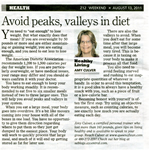 Avoid peaks and valleys in diet Avoid peaks and valleys in diet
You need to "eat enough" to lose weight. But what exactly does that mean? If you are overweight by 50 pounds or more and are either maintaining that weight or gaining, you are eating enough, and you need to eat less to lose weight.
The American Dietetic Association recommends 1,200 to 1,500 calories per day for weight loss. If you are particularly overweight, or have medical issues, your range may differ and you should always confirm it with your doctor.
You have to eat enough to keep your body working steadily. That is why it is recommended to eat five to six smaller meals instead of two to three larger ones. This will help you avoid peaks and valley in your system.
When you eat a large meal, your body goes into overdrive. It's a bit like movers coming into your house with all of the boxes in one load. You have no opportunity to give them direction regarding where to put them so they just get dumped in the easiest place. Your body will work to quickly process that large meal, and much of it will end up getting stored as fat for later use.
There are also the valleys to avoid. When you don't eat for some time after that large meal, you will become very tired. This is because it is taxing on your body to make it process all that food.
You also need to avoid feeling starved and rushing to eat inappropriate quantities of whatever is handy. In order to avoid this temptation, it is a good idea to always have a healthy snack with you, such as a piece of fruit or a low-calorie bar.
Becoming honest with yourself is often the first step. Try using an objective measure, such as counting calories, to see exactly how much you are actually eating each day.
|

